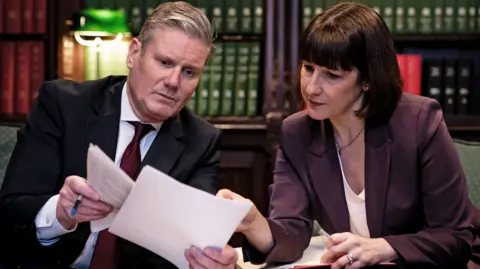 PA Media
PA MediaThe new Labour government has been in power for just over three weeks.
In that time, it says ministers have found government departments in a much worse state than they thought.
On Monday, the Chancellor will argue the public finances are in a bad place – and that will mean tough decisions.
To use the Westminster jargon, she’s rolling the pitch for announcements that might not be popular. But how much of what the government is facing is actually a surprise? And how much are these ministers trying to shape the political narrative?
The first thing to highlight is that we already had a good idea of the state of the country’s books. The Office for Budget Responsibility (OBR) publishes them twice a year – we last got a full breakdown last November.
We also knew during the election campaign that there were tough decisions to come.
The BBC covered them – including warnings that there were likely to be tax rises or cuts or both as a result of a squeeze on public spending.
The Institute for Fiscal Studies (IFS) suggested some government departments could see cuts of between £10bn and £20bn – something Labour were reluctant to engage with during the campaign.
So what is new?
Treasury insiders are claiming there have been surprises since they took over.
One is that public sector pay deals are likely to cost a lot more than expected.
Independent pay review bodies have said teachers and nurses should get 5.5% – more than most were expecting.
The last government budgeted for a lower settlement of 2%, sources say, so to fund the much higher deal will cost billions of pounds. If a similar increase happens across the public sector, it would cost billions more.
Labour has also claimed that hundreds of millions were being spent on the Rwanda scheme – a lot more than it realised.
Although some of that money was pay for civil servants who would have been working for the department anyway, sources say a lot of it was operational costs which were only discovered once the new government went through the books.
The Department of Health and Social Care has also warned of hospital building programmes in England costing a lot more than budgeted for.
Sources have also said there are extra spending commitments announced after the Autumn Statement which need to be paid for. Expect to hear about “in-year pressures” – extra spending that needs to be allocated immediately.
‘Black hole’
The Treasury intends to publish a full report and breakdown on Monday, explaining where it thinks it has found a “black hole”.
At that point we will be able to scrutinise the calculations and see what is really new.
But it was known before the election that whoever was in power afterwards would face big challenges.
Rachel Reeves started talking about a tricky inheritance well before polling day.
Ms Reeves told the Financial Times in June: “We’ve got the OBR now.
“We know things are in a pretty bad state… You don’t need to win an election to find that out.”
This is not just about the economy.
Ministers have been pointing to other areas where they say things are worse than they expected – the health service, prisons, the environment and more.
On prisons, the justice secretary announced some offenders in England would be released earlier to ease overcrowding. She blamed that on the “scale of the emergency” the new government had left.
It is true to say there are big challenges with overcrowding. Senior ministers in the last government wanted action taken – but it was not signed off before the election.
But was it a surprise to the incoming government?
Sources in the justice department point to the system being a lot closer to “disaster” than they thought and how little time they had to try to solve the issue.
They will, however, have had a good idea because the government publishes weekly figures showing prison numbers. They knew ministers in the last government were pushing for a quick decision.
The picture is not a complete surprise, even if some specific details might have become clearer.
Framing the narrative
So let’s return to the politics. Because a lot of this is about politics.
The new government is trying to frame the debate over the next few years. It wants to argue it has been left such a dire inheritance that it has to do some pretty unpopular things.
It wants you to blame the Conservatives – not Labour.
The former chancellor Jeremy Hunt argues this is all nonsense and has warned Labour is paving the way for tax rises it did not disclose during the election campaign.
The Labour strategy though is not a new one.
The Conservatives did something similar when they won power in 2010, arguing that Labour in power had crashed the economy and left the government with no cash – and that was why austerity was essential.
It’s an argument Conservatives still make to this day.
And remember, Labour in power is making choices.
It has pledged not to increase income tax, National Insurance, VAT and corporation tax.
It has said it will not borrow extra money for day-to-day spending. It is likely to choose to pay public sector workers more than inflation, in line with recommendations from the pay bodies.
So the government has possibly found a few surprises that make its life a bit harder.
But it’s also trying to frame the political narrative and prepare the ground for what comes next.
